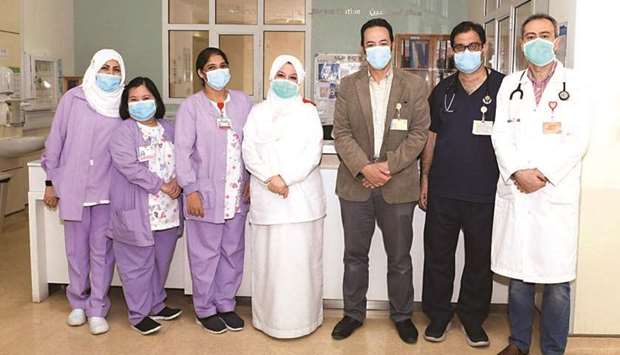To date, almost 3,000 patients have received care via the teleconsultation service introduced by the Advanced Heart Failure Unit at Hamad Medical Corporation’s (HMC) Heart Hospital as part of efforts to contain and curtail the spread of Covid-19.
“The Covid-19 pandemic necessitated drastic changes across all services, and our department developed a strategy to enable us to continue offering care to patients in their homes to help protect them and our staff," said Dr Amr Mohamed Badr, senior consultant cardiologist and director of the Heart Failure Outpatient Department at Heart Hospital.
"We piloted a telemonitoring service that combines teleconsultation led by physicians and telemonitoring provided by nurses. The service ensured we understood our patients’ care needs and were able to provide solutions by prescribing necessary medications and procedures while also using teleconsultation for follow-up care with physicians,” he explained.
According to Dr Badr, patients benefiting from the service include those eligible for procedures such as left ventricular assist device implantation, implantable cardioverter-defibrillator, and heart transplantation.
“These procedures help to improve patients’ health status and quality of life. The department also provides clinical consultations and short-stay admission for medical treatment to patients with fluid overload. The service helped prevent the deterioration of patients’ condition. On average, the department currently attends to between 500 to 600 patients every month through telemonitoring and outpatient consultations,” said Dr Badr.
Heart failure, a condition in which the heart is unable to pump blood around the body properly, is a chronic disease and requires lifelong management.
“The condition usually occurs when the heart has become weak as a result of high blood pressure or an injury like a heart attack. Heart failure does not mean your heart has stopped working. It simply means it needs more support. Heart failure is a progressive and chronic condition requiring long-term follow-up care. The condition starts slowly and gets worse over time. When patients develop symptoms, it is called congestive heart failure. Symptoms can often be controlled for many years during which the affected patient can lead a reasonably normal and active life,” noted, Dr Badr.
“For patients who require face-to-face consultations, we accommodate them in our clinics. We have reserved about 30% of our clinic slots for these patients. The department has also introduced a new service for ambulatory blood pressure monitoring which has significantly helped patients with advanced heart failure by providing monitoring and treatment,” said Hajer Abdulla, head nurse at the Advanced Heart Failure Unit.
Ambulatory blood pressure monitoring is a process that allows patients to be sent home with a portable monitor connected to a blood pressure (BP) cuff that automatically inflates at regular intervals and records many BP readings over 24 hours. It provides a wealth of data on what happens to patients’ BP when they’re asleep, eating, or just going about their daily activities.

